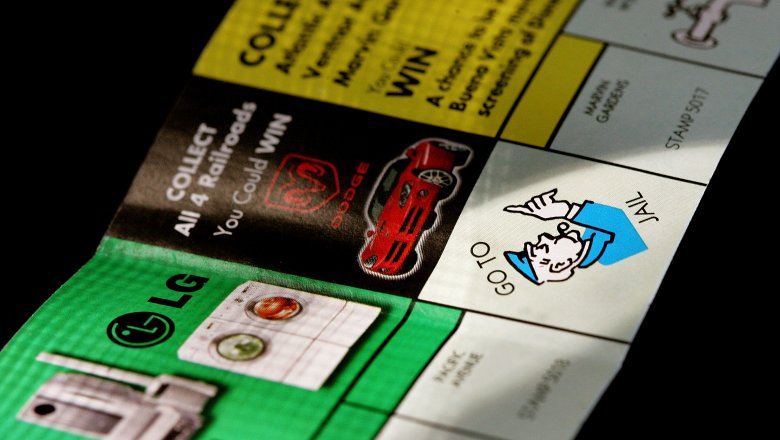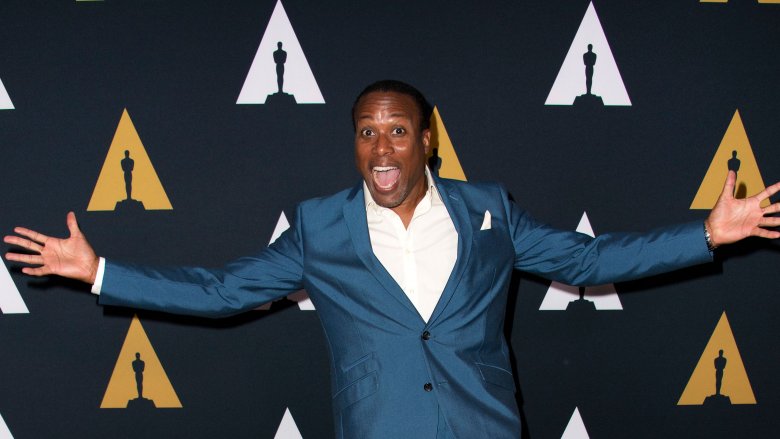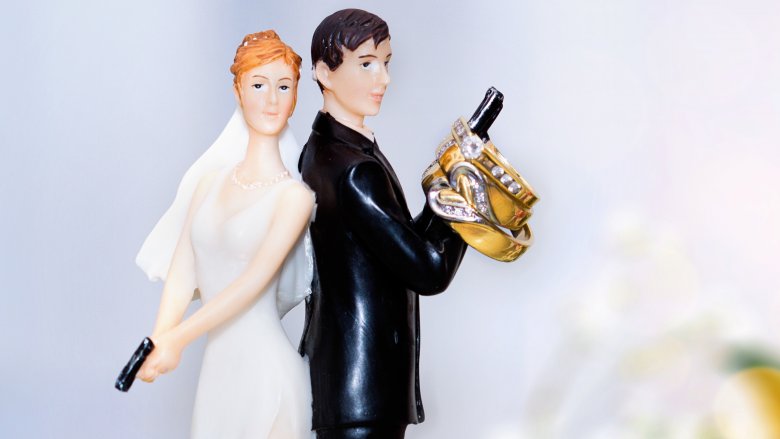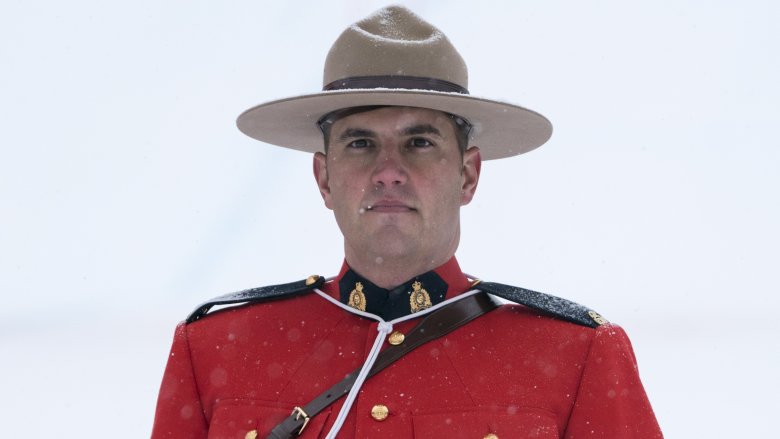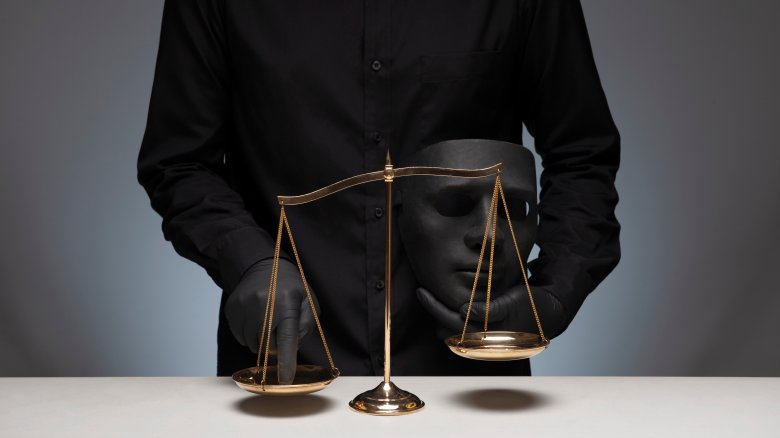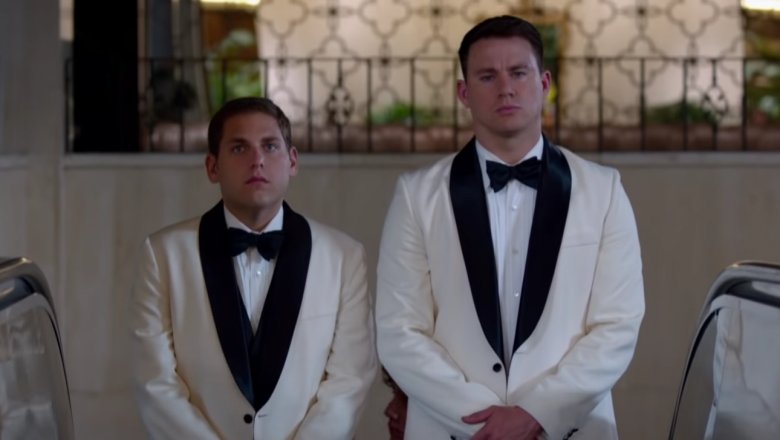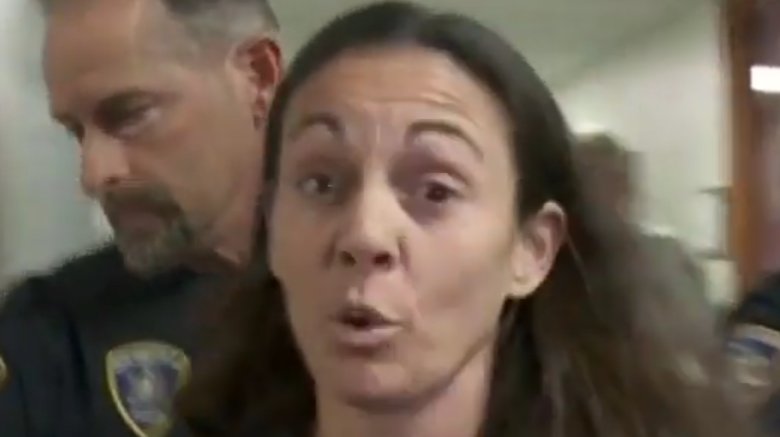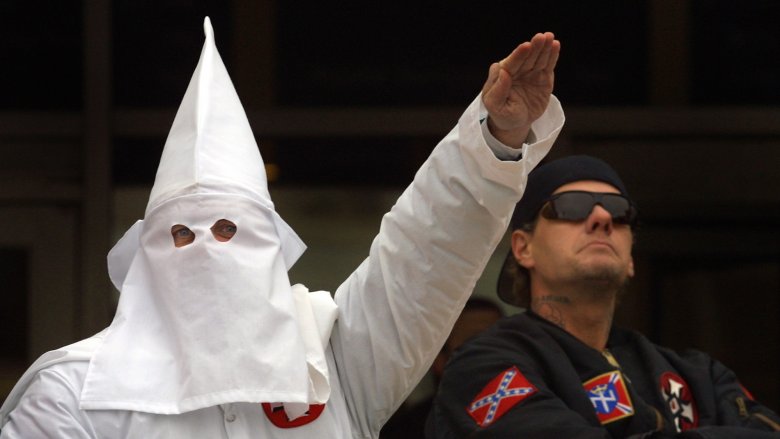Real Undercover Cop Stories That Sound Like Over-The-Top Movie Plots
If all the world's a stage, then undercover cops are the ultimate method actors. They blur the line between life and art, following a script that's written in real time and has real consequences. Nailing their part means nabbing the bad guys, but bad acting can be fatal. Depending on how it all plays out, a case may have the makings of riveting cinema.
Some Hollywood-worthy stories have already been told in films like Donnie Brasco and BlacKkKlansman, albeit with fictional elements added. But there are plenty of unembellished tales about undercover cops whose details might rival a screenwriter's wildest ideas. These cases are laden with real-life drama, comedy, suspense, intrigue, and plot twists so insane that even a straightjacket couldn't fully wrap its head around them. So feel free to munch on a tub of buttery, overpriced popcorn while you read these real undercover cop stories that sound like over-the-top movie plots.
FBI and McDonald's team up to stop Monopoly fraud
In 1987 McDonald's introduced its hugely popular Monopoly competition. As the Daily Beast described, patrons "feverishly collected Monopoly game pieces" on McDonald's merchandise in hopes of scoring awesome prizes like a trip to Jamaica, a PT Cruiser, or a not-nearly-as-awesome Filet-O-Fish. Every player had a decent chance of winning obesity, but the odds of winning the $1 million grand prize were a discouraging 1 in 250 million. So criminals broke the laws of probability. For 12 years a network consisting of psychics, convicts, strip club owners, drug traffickers, mobsters, and, strangely, a family of Mormons rigged the game. They won nearly every prize, duping McDonald's out of over $24 million.
Surprisingly, they weren't led by the Hamburglar. More surprisingly, the ringleader was ex-policeman Jerome Jacobson. Jacobson achieved his dream of becoming a cop in 1976, but a rare neurological problem cost him his job. Marital problems later cost him his wife, but not before she got him a job providing security services for an accounting firm. That ultimately led to him overseeing the production of the McDonald's Monopoly pieces. Jacobson monopolized the winning pieces, assigning prizes to collaborators he recruited randomly in exchange for massive kickbacks. But someone tipped off the FBI, which worked with McDonald's to topple the operation, running promotional games and even recording a bogus winner in a phony commercial. In 2001 agents made eight arrests, and Jacobson eventually confessed.
An undercover grandma infiltrates a drug ring to save her family
Stereotypically speaking, grandmas are sweeter than pie. They give you hugs and kisses — and maybe spankings for misbehaving. But unless your grandma was a seasoned cop, you probably don't picture these pie people using the long arm of the law to spank wrongdoers. Yet in 1986, Oregon grandma Pat Morrison, an ex-textile worker who lost her job because of an arm injury, went undercover and almost single-handedly brought down a drug ring.
As People recounted, the 44-year-old Morrison was looking after her grandkids, children of her daughters Tonda and DeVonna, who were nursing a drug habit by selling narcotics for a man named Jimmy Ray Goddard. Morrison decided to act when she visited DeVonna's home and saw a "squalid five-acre" property with "scary-looking men" standing guard, pit bulls, and a bunch of Goddard's buddies seemingly "shooting or snorting" drugs.
Police had wanted to nail Goddard for years but lacked sufficient evidence until Morrison volunteered to get it. She started as an informant but performed so well that "within two weeks police granted her request to act as an unpaid undercover agent." She convinced Goddard that she was a drug dealer and got him to lead her to his narcotics lab. Goddard tested Morrison by ordering her to "give up [her] wire" while an armed guard watched, but she aced that test by "playing dumb." Goddard was eventually sentenced to 15 years behind bars.
A cop causes a crash and hides behind his undercover alias
Actor Clayton Tanksley (above) was no stranger to aliases. He used the pseudonym Clayton Prince when he played Denise Huxtable's "reggae-singing boyfriend" on the Cosby Show. But in 2009, a stranger using an alias sent his life and his SUV tumbling out of control. It happened before dawn on a South Jersey highway. A driver rear-ended him, crumpling his SUV "like an accordion." "It was like a shark attack," Tanksley recalled, "so sudden, out of the blue." Out of the thin blue line, to be exact. He had narrowly survived an encounter with a man named William Billingham, a detective sergeant for the New Jersey State Police. Tanksely didn't know that, though, because Billingham was undercover.
Billingham also might have been under the influence. A criminal complaint claimed he drove drunk and fell asleep at the wheel. Tanksley, who suffered flashbacks and back trouble, was saddled with an almost $30,000 medical bill and tried to sue "William Gillespie," Billingham's undercover alias, who obviously didn't exist. Against police policy, Billingham withheld his real identity, and other state troopers covered for him by "[providing] Tanksley's insurance company with fictional and incomplete information." Tanksley didn't learn the truth until journalists tracked down the detective two years later. The New Jersey State Police paid Tanksley $150,000 to settle the case.
Police stage an elaborate wedding ceremony full of inside jokes
Plagued by E. coli-infested, lead-contaminated water since 2014, the long-beleaguered city of Flint, Michigan, has also struggled with poverty and drug woes that go way back. In 1987, the city was shackled to a speedball and chain. Cocaine and prescription pills dominated the streets along with LSD and pot. Money magazine dubbed Flint America's worst place to live, per the Atlantic. Determined to rain on the crime parade, undercover officers invited more than 40 suspected drug dealers to a wedding in 1990.
The bride-to-be was Officer Debbie Williams, who had convinced the local drug dealers she was a "habitual stoner." The groom was Lacy "Moon" Brown, who won criminals' trust by mooning them. Moon was retiring soon and wanted "to go out with a bang," so he proposed a wedding-themed bust. It had a decorated venue, food, booze, and a partially cardboard cake decorated with sugar bees because it was a sting operation. Officers formed a fake band called SPOC ("COPS" spelled backward). The cue to start cuffing people was when the band played "I Fought the Law (and the Law Won)." Williams reached for the gun in her garter and another officer told the cops to rise. Dozens of incredulous suspects were arrested, resulting in multiple convictions. Williams eventually got married (for real this time) to an officer involved in the sting.
An undercover Mountie sings in a rock band
It was October 1969. America was coming down from the drug-fueled musical high known as Woodstock, and in Canada, Winnipeg police were preparing to use music to crack down on drug dealers. As the Reminder detailed, the Royal Canadian Mounted Police enlisted newly minted Mountie Andy Arsenault to break into the local music scene as part of a sting operation. (Really, "sing operation" would be a more fitting description, and maybe a decent movie title.)
Arsenault had sung in rock groups before and hit just the right notes to become the vocalist of the band Prodigal Son. Using the alias Andy Taylor, he performed with Prodigal Son for 10 months and purchased drugs more than 200 times from various dealers. In 1970 Arsenault rocked Winnipeg to its core, but not with his singing. He joined a band of fellow Mounties in charging 69 people with drug offenses. Arsenault instantly went from local rock star to Canadian Benedict Arnold, particularly among young residents. "In court, I was kicked by people," Arsenault recalled, marking what's possibly the least polite thing a Canadian has ever done. Things got so bad the Mountie "feared for his life" and left town.
Two hellbent detectives go undercover as a pair of defense attorneys
Tennessee detective James Patrick Henry suspected that a man named James Edward Dawson Jr. had murdered Troy Green in 2006 "but found no evidence linking him to" the crime, according to Courthouse News. So Henry and detective Doug Brannon enacted a diabolical plan to obtain evidence. First, Henry told a witness to alter their testimony to incriminate Dawson. That witness, Monte Cox, bought a gun from a guy called "Dirty Eddie" after Green's murder. That gun may have been in Green's possession when he died, so Henry instructed Cox to name Dawson as Dirty Eddie, despite Cox originally insisting they were different people.
After Dawson was jailed, Henry recruited Dawson's cellmate, Todd Sweet, whom Knoxville News described as a "con man" who swindled roughly 50 people out of "money, land, and vehicles." Court documents revealed that Sweet tricked Dawson into believing he had ties to organized crime and could secure two top-notch attorneys for Dawson. Posing as those lawyers, Henry sent letters and spoke on the phone with Dawson, instructing him not to cooperate with his court-appointed lawyer and to divulge information about his criminal activities to Sweet. Detective Brannon, also masquerading as an attorney, met with Dawson, dangled the possibility of getting him "released from jail the following Saturday," and advised him to stonewall his public defender to buy time. Of course, no judge worth their gavel would condone such blatant disregard for a suspect's Miranda rights, and the murder charges were dropped.
A '21 Jump Street'-style drug bust coincides with the '21 Jump Street' film premiere
In 2012's 21 Jump Street Jonah Hill and Channing Tatum play a pair of young, quasi-incompetent cops who get recruited to pose as high school students in order to root out a drug ring. Gut-busting screw-ups ensue, and as Roger Ebert pointed out, the movie makes fun of its own "improbabilities," like how Hill and Tatum's characters look ridiculously old compared to actual high schoolers. But reality one-upped Jump Street's improbability when an undercover officer busted a group of high school drug dealers the same week the film premiered.
Baby-faced and wearing braces, 22-year-old rookie officer Alex Salinas attended Exeter High School in California for eight months. Somewhat parallelling Tatum's character in 21 Jump Street, Salinas had a chance to be a better student this go round. A "former C-student," per the Associated Press, he "got a lot of A's" as a cop. Salinas also got sent to detention on purpose and went to pep rallies and football games. In the process he made genuine friendships, which weighed on him a bit when he made the bust. Salinas didn't make hilarious errors like Hill and Tatum, but on the first day of school everything almost fell apart in comically improbable fashion. As the LA Times explained, a teacher who had no clue Salinas was a cop joked that there was "an undercover narc officer" in the class.
A prostitute posing as a cop 'busts' a cop undercover as a john
Admittedly, an undercover operation to catch ladies of the evening doesn't sound like Hollywood material at first blush. But maybe that's because filmmakers don't normally explore the ridiculous possibilities such scenarios have to offer. For example, imagine a movie that revolves around police pursuing a prostitute who falsely arrests and robs unsuspecting johns. Crazy, right?
Enter Lisa Greene, who in 2006 was suspected of charging men to enter her. Now, enter Anonymous McCop, the unnamed New York officer tasked with catching her. As the Associated Press detailed, the policeman posed as a john and approached Greene. She then entered his car to negotiate the price for a bite of her Big Apple, but then asked if he was a cop. Obviously, he said no, to which she replied, "That's okay because I am." Greene then whipped out handcuffs and a two-way radio into which she snapped, "Move in!" Suspecting an attempted robbery, officers watching the interaction moved in and apprehended Greene.
An undercover agent weds a woman he investigated
Whether it's Paul Walker falling for Vin Diesel's sister in the first Fast and the Furious or Arnold Schwarzenegger developing feelings for the woman he's sent to find in Kindergarten Cop, we've probably all seen some form of the storyline of an undercover character who has a romance with someone they deceived for investigative purposes. These dynamics are largely charming on screen, but the real-life case of U.K. constable Jim Boyling had all the charm of a psychological thriller.
As part of the Metropolitan Police covert unit, Boyling investigated environmental and animal rights groups between 1995 and 2000, according to the Guardian. Under an assumed identity, he had intimate relationships with three female activists. One activist, identified as "Laura" or "Rosa" depending on the source, dug into Boyling's background after he abandoned her. Boyling had fabricated a mental breakdown and said he needed to go overseas. But it was Laura whose mind began to unravel as she discovered that she'd been tricked.
Growing "increasingly frightened and paranoid," Laura tracked Boyling down, and he confessed to being a cop. Then he professed his love, and they married. But there was no happy ending. Laura described their relationship as "abusive, manipulative," and "controlling." The dysfunctional couple had two children who were "severely disabled with limited life expectancy." Boyling got booted from the force for misconduct.
A cop and a DJ investigate an undercover FBI agent
In TV and movies, law enforcement organizations clash over cases. This so-called "jurisdiction friction" isn't fiction. For example post-9/11 anti-terrorism efforts fomented a "sometimes tense rivalry" between the FBI and NYPD. But in a bizarre case of accidental friction, Colorado detective Shaun Farley unwittingly hindered a federal investigation.
It was 2016 and FBI agent Charles Johnson had just wrapped up a different film-worthy endeavor. Per the Intercept, following the 2014 standoff between Nevada rancher Cliven Bundy and the Bureau of Land Management, Johnson filmed Bundy and his backers under the guise of making a documentary. Then he traveled to Glendale, Colorado, to talk with opponents of a proposed condo development project for reasons that remain unclear.
Presenting himself as an "investigative consultant" hired by a journalist "to look into an ethics complaint," Johnson went door-to-door questioning condo opponents who were quoted in the local newspaper. Alarmed residents called the police, and Detective Farley suspected Johnson was an unlicensed private investigator. Farley arranged a sting with the aid of a strip club DJ whom Johnson wanted to interview. Pretending to be the DJ's old college buddy, Farley recorded Johnson's responses to questions about his investigation and possible lack of license. Johnson's evasiveness led Farley to arrest him, whereupon Farley found fake IDs and the contact info of the fake production company used to film Cliven Bundy. A prosecutor dropped the charges after the FBI sent a letter.
A cop plots to murder her husband via hitman
For 12 years Valerie Cincinelli (above) wore NYPD blue, but if the FBI is right, then prison orange suits her much better. In 2019, the officer ran afoul of the law in the foulest of ways. Cincinelli tried to enlist her boyfriend, John DiRubba, to hire a hitman to murder her estranged soon-to-be-ex-husband, Isaiah Carvalho, with whom she shares a son. The New York Daily News reported that the boyfriend feigned agreement and secretly informed the FBI. DiRubba would soon realize that by warning authorities he was also protecting his own 15-year-old daughter, whom Cincinelli later "added to her hit list" because she felt the teen cut into quality time with DiRubba.
Now assisting the FBI, DiRubba told Cincinelli he could get a killer for $7,000, which she readily provided. Then agents faked her husband's death. Isaiah Carvalho recalled, "They had me sit in my car. They put glass on the floor and all over me, and had me hunch over into the passenger seat." An agent pretending to be a hitman texted Cincinelli photos of the fake crime scene, and asked for another $3,000 to murder DiRubba's daughter. Cincinelli allegedly wasted no time planning an alibi and ordering her boyfriend to delete incriminating texts, at which point the FBI pounced. As of this writing, her case is ongoing.
A klansman attempts to build a death ray
The Ku Klux Klan is an awkward mélange of vicious bigotry and stupid pageantry. They've brutally murdered and terrorized black people yet also dress like deformed ghosts and give high-ranking members ludicrous titles like Exalted Cyclops and Grand Giant. In 2012, New York-based klansman Glendon Scott Crawford added another layer of scary weirdness when he conspired with Eric Feight to turn "an industrial-grade X-ray radiation device" into a weapon of mass destruction.
Crawford said his friends called him "a cross between Darth Vader and Forrest Gump," presumably because Vader had a murderous dark side and because stupid is as racist does. Darth Gump didn't want a Death Star but a portable, remote-controlled death ray he planned to use on Muslims. Per the Justice Department, his potential targets included mosques, an Islamic community center, and a school, perhaps to help fill out his white terrorist bingo card. Crawford sought assistance from Chris Baker, the imperial wizard of North Carolina's Loyal White Knights of the Ku Klux Klan.
Unbeknownst to Crawford, Baker had felony charges to deal with, so he apparently made a deal with the FBI. The imperial wizard wore a wire, capturing damning statements by Crawford. An undercover FBI agent met with Crawford to examine "small tubes for a would-be X-ray device," and Eric Feight built a remote control at Crawford's behest. Crawford received a 30-year prison sentence, and Feight was sentenced to just over eight years.

